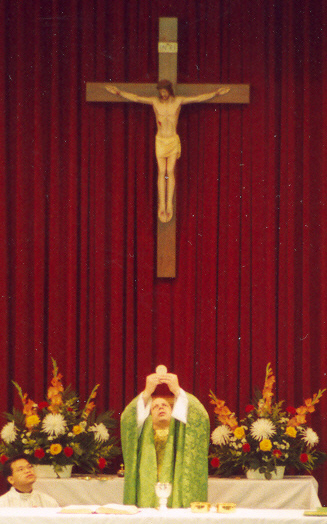
Return to
Index The Catholic Faith
Return to
Level Three Topic Index
Home Page

The Second Vatican Council called the Holy Eucharist the source and center of the Christian life. This means that it is the most important part of our faith. Why? Because the Eucharist is not only a way to receive grace but it is Jesus himself, the source of all grace! There is not one saint in the Church who did not treasure the Blessed Sacrament as the greatest gift of God to the Church. All of these holy men and women, teenagers, and children knew how necessary Holy Communion is for growing in our relationship with Jesus, so they tried to attend Mass as often as possible.
The Eucharist and the Other Sacraments
Because of the Real Presence of Jesus under the appearances of bread and wine, the Eucharist is called the greatest of sacraments. As the famous teacher and saint, Thomas Aquinas, said: "The noblest sacrament is that in which Christ's Body is really present. The Eucharist crowns all the other sacraments."
Baptism makes us members of the Church and gives us the right to receive the Eucharist. The gifts of the Holy Spirit, received at Confirmation, help us to know and love the Blessed Sacrament as mature Catholic Christians. Penance takes our sins away and helps us to go to Holy Communion with pure hearts. Anointing strengthens and cleanses us and prepares in a special way those who are about to receive Jesus for the first time on earth. Holy Orders gives us priests who will celebrate Mass and consecrate the gifts of bread and wine, changing them into the Body and Blood of Jesus. In Matrimony a husband and wife show their love by giving themselves to each other; this reminds us of the Eucharist in which Jesus shows his love by giving us his Body and Blood.
Receiving the Eucharist Properly
We will grow in grace only by receiving the Blessed Sacrament properly. Someone can go to Communion a hundred times, but if he does not have faith in Jesus and the desire to love him, these Communions will not do him any good. So a very important question is this: How can I best prepare myself to receive Jesus in the Eucharist? The Church has made some wise rules to help us.
First, we must never receive Jesus if we have a mortal sin on our souls. We must first confess to a priest and be freed from this sin. If we have committed venial sins, we should ask God to forgive them during the Penitential Rite of the Mass.
Second, we must have faith in Jesus' Real Presence and tell him that we believe in it. Saint Paul told the Christians in Corinth: "Whoever eats the bread or drinks the cup of the Lord unworthily sins against the Body and Blood of the Lord. . .He who eats and drinks without recognizing the Body eats and drinks judgment on himself" (1 Cor 11:27, 29).
Last, we must keep the Eucharistic fast. This means that we do not eat or drink anything (except water or medicine) for one hour before receiving Our Lord. This is a small sacrifice we offer to Jesus, to show him that we honor his Body and Blood as special food and drink. (Those who are advanced in age or who suffer from any infirmity, as well as those who take care of them, can receive the Holy Eucharist even if they have taken something during the previous hour.)
Devotion to the Blessed Sacrament
Since the Real Presence of Jesus remains in the Blessed Sacrament after Mass, the consecrated bread is placed in the tabernacle for safekeeping, for use at other Masses, and for bringing Communion to the sick.
But Jesus is not kept in our churches for "practical" purposes only. He is there so that we can come to him at any time during the week. Whenever we want to adore or thank God, we can go the church to worship him in the tabernacle. Person to person, we can tell him our needs and ask him to bless our studies, our friendships, our hopes, and our dreams.
Sometimes the Eucharist is taken out of the tabernacle and put into a special container called a monstrance. It has a little glass window that allows us to see the Host, the consecrated bread. Often, a special prayer-service is held during which the priest holds up the monstrance and blesses the people with Jesus. This is called Benediction. These signs of love toward the Eucharist are known as devotions to the Blessed Sacrament. They are greatly recommended to us by the Pope and the bishops of the Church.
Used with the permission of The Ignatius Press 800-799-5534
Return to
Index The Catholic Faith
Return to
Level Three Topic Index
Top
Home Page